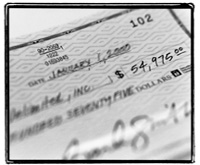|
|||
 |

Positive Pay Enhancement Combats
This form of check fraud has been on the rise and poses a significant threat to corporations. "Over the past few years, forgers have increasingly used sophisticated technology to change payee names on checks," explains John Smith, Vice President and Product Manager for Disbursements at Commercial Bank of America. "Our defense to this trend is to add a verification of the payee information." In altered-payee fraud, a forger changes the payee name on a check and presents it to a bank for payment. A forger might replace the existing name with a fictitious name or the forger’s own name. Or, if two payees are listed, one person might fraudulently remove the other party’s name. A traditional positive pay reconciliation service allows banks to validate the checks presented for payment against their clients’ accounts using the checks’ MICR line data and issue information provided by the client. This process does not compare authorized payee names against those checks. But with the payee verification enhancement, a company with accounts on positive pay would include payee information in the check-register file that it provides to the Bank. When one of the company’s checks is presented for payment, the Bank would verify the payee name as being the intended payee, using optical character recognition (OCR) and intelligent character recognition (ICR) technologies. A check with an unmatched payee would be rejected as an exception and presented to the company for a "pay" or "return" decision. Successful Test Results So far, two forged checks have been identified using this technology, including one item for more than $200,000." At Commercial Bank of America, we’ve seen growth in the number of general fraud items exceeding $100,000," Mr. Smith says. "Clearly, companies have more at stake than ever." Available in Third Quarter
On the Horizon: Seal Encoding "Our ongoing test of the seal encoding technology is generating promising results," Mr. Smith says. "We’re getting a successful seal read rate of almost 99% of the 30,000 checks per month that we’re evaluating." Seal encoding might be a useful alternative for a company that currently does not use positive pay. A client that cannot send an issue file to the Bank might also use seal encoding. Or, a company might continue using positive pay and add the seal encoding feature to verify payee information. "We expect to deliver this option to clients toward the end of this year," Mr. Smith says. Contact your Treasury Management Consultant or Relationship Manager to learn more about how these new technologies can help your company fight check fraud. |
|||||||
Manage Your Subscriptions to receive future topics tailored to your specific interests
|

 Commercial Bank of America will soon begin offering positive pay with payee verification, an enhancement to the Bank’s positive pay reconciliation service specifically designed to detect altered-payee check fraud.
Commercial Bank of America will soon begin offering positive pay with payee verification, an enhancement to the Bank’s positive pay reconciliation service specifically designed to detect altered-payee check fraud.
